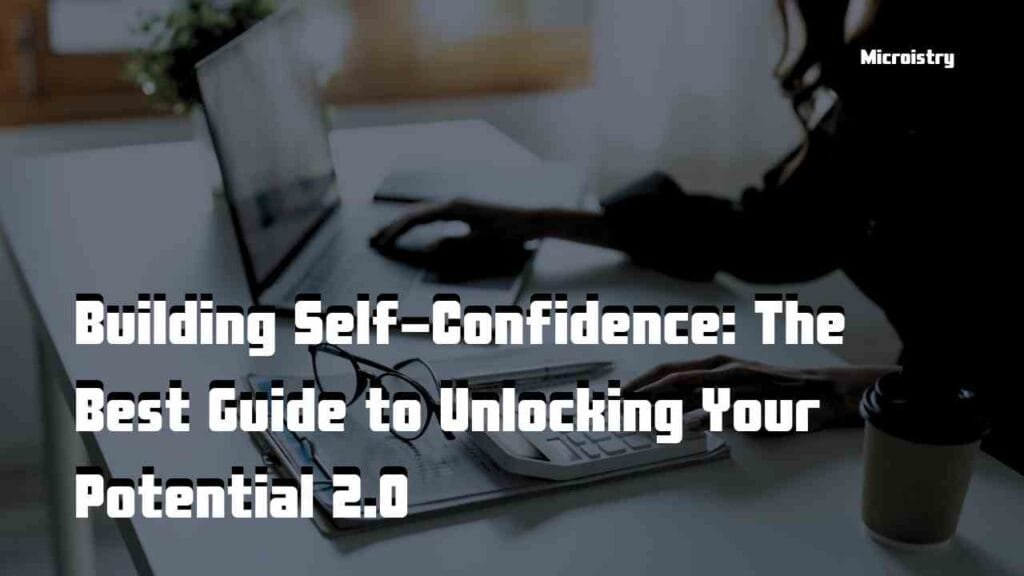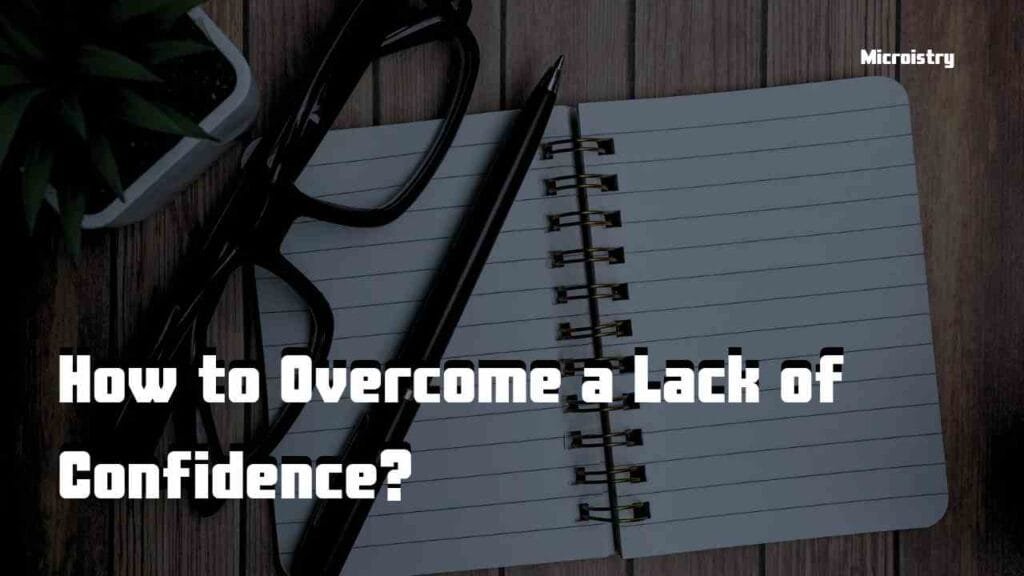Building self-confidence is an essential thing in our life. Self-confidence is the most important foundation of success and personal growth with happiness and satisfaction. It also affects how we view ourselves, how we treat others and also how we deal with our life’s challenges. If you often struggle with self-doubt or low self-esteem, don’t worry, you can build confidence with consistent effort and the right strategies.

In this blog we will explore practical ways to build self-confidence and boost it quickly. You can train yourself to be confident and overcome a lack of confidence.
Table of Contents
What Is Self-Confidence?
Self-Confidence improves your abilities, skills, and judgment. It allows you to trust yourself and take risks and also face challenges without fear of failure. Confident people radiate positivity and take initiative and are more likely to achieve their goals.
5 effective ways to boost your self-confidence

Building confidence is a very important thing in life and if you want to strengthen your confidence, these five techniques will help you:
1. Develop a positive mindset
Mindset plays an important role in all tasks, problems and solutions, decisions and even success. Positive thinking means thinking optimistically and constructively. It involves focusing on opportunities rather than obstacles and seeing the good in every situation. And it helps to believe in your ability to overcome all challenges. A positive thinker approaches life with confidence, gratitude and resilience which leads to better mental health, personal growth and success. Your thoughts will shape your confidence. If you constantly doubt yourself or engage in negative self-talk, it will harm your self-esteem.
How to do it?
- Practice self-affirmations such as “I am capable,” “I believe in myself,” and “I deserve success.”
- Transform negative thoughts into positive ones—replace “I can’t do this” with “I will learn how to do this.”
- Stay connected with positive and supportive people who uplift and encourage you.
2. Set and achieve small goals
Confidence grows when you see progress. Setting small and achievable goals is what helps you gain confidence in your abilities.
How to do it?
- Break big goals into smaller steps.
- Celebrate each accomplishment, no matter how small.
- Track your progress to boost motivation and self-confidence.
3. Improve your skills and knowledge
A lack of confidence often comes from feeling unprepared. The greater your skills and knowledge, the stronger your confidence will be.
How to do it?
- Read books, take courses and learn new skills related to your interests.
- Practice regularly to become more competent in your field.
- Seek feedback and use it as a means of improvement.
4. Mind your appearance and body language
Your physical appearance and body language can significantly impact your level of confidence.
How to do it?
- Dress well and maintain good hygiene, this helps you feel good about yourself.
- Stand up straight, maintain eye contact and use open body language.
- Smile more often, smiling naturally boosts your confidence and makes you look friendly.
5. Get out of your comfort zone
Growth happens when you push your boundaries. Facing your fears and accepting challenges will boost your confidence.
How to do it?
- Try new experiences that make you feel a little uncomfortable.
- Speak up in meetings, start conversations or take on leadership roles.
- Remind yourself that failure is a part of growth and learning.
How can I increase my confidence quickly?

If you need an instant confidence boost before a big event, interview or presentation, try these instant confidence-boosting techniques:
- Power posing: Stand in a powerful pose (hands on hips and shoulders back) for 2 minutes. This boosts confidence and reduces stress.
- Listen to motivational music: Songs with powerful lyrics can instantly improve your mood.
- Practice deep breathing: Take a deep breath, hold for a few seconds and exhale slowly. This calms your nerves and improves focus.
- Dress for success: Wearing clothes that make you feel good boosts confidence.
- Visualise success: Visualise yourself before and after successfully achieving your goal.
How to train yourself to be confident
Confidence is like a muscle—the more you exercise it, the stronger it grows. It’s not something you’re born with; it’s a skill that can be developed over time. If you’re struggling with self-doubt, know that confidence is within your reach. Here’s a step-by-step guide to building lasting confidence in yourself.
1. Practice self-discipline
Confidence often comes from knowing that you have control over your actions and decisions. When you commit to something and follow through, you build trust in yourself.
- Start by setting small, achievable goals every day. This could be as simple as getting up early in the morning, reading a few pages of a book, or exercising for 10 minutes.
- The more you stick to your routine, the more disciplined you’ll become, and that discipline fosters confidence.
- Avoid procrastination, as it breeds self-doubt. When you take action, even in small ways, you develop a sense of confidence.
2. Face your fears regularly
Fear is a major obstacle to confidence, but the more you confront it, the less power it holds over you.
- Identify what makes you uncomfortable—speaking in public, approaching new people, or making decisions—and push yourself to do those things regularly.
- Start small and gradually increase the difficulty. For example, if you fear public speaking, start by practicing in front of a mirror, then move on to speaking in front of a friend, and eventually in front of a group.
- The more you expose yourself to challenges, the more resilient and confident you will become.
3. Learn to accept compliments
Many people struggle to accept compliments because they feel unworthy or embarrassed. However, learning to accept compliments graciously is an important step in building self-confidence.
- When someone compliments you, resist the urge to undermine or dismiss it. Instead, simply say, “Thank you.”
- Keep a journal of the compliments you receive and reread them when you feel down. This reinforces positive beliefs about yourself.
- Recognize that accepting compliments doesn’t mean you’re arrogant; it means you acknowledge your strengths.
4. Get physical exercise
Your physical health has a direct impact on your self-confidence. When you take care of your body, you feel better about yourself, both physically and mentally.
- Exercise releases endorphins, which reduce stress and increase feelings of well-being.
- A strong body leads to a strong mind. Activities such as weight training, yoga or even going for a daily walk can improve posture, body language and overall self-esteem.
- Dressing well and maintaining good hygiene also play an important role in feeling more confident. When you look good, you naturally feel more confident.
5. Practice speaking clearly and firmly
Confident people communicate effectively. If you have trouble speaking, improving your communication skills can make a big difference.
- Practice speaking slowly and clearly. Many people tend to speak fast when they feel nervous.
- Stand up straight, make eye contact and use gestures to express yourself.
- Try recording yourself speaking on different topics and listen to the playback to identify areas of improvement.
- Assertiveness doesn’t mean being aggressive. It means expressing your thoughts and opinions respectfully but firmly.
6. Develop a positive inner voice
The way you talk to yourself affects your self-confidence. Negative self-talk can be incredibly damaging, while positive affirmations can build a stronger self-image.
- Replace self-criticism with self-encouragement. Instead of saying, “I’m so bad at this,” say, “I’m learning and improving every day.”
- Use affirmations like “I am capable,” “I believe in myself,” and “I have something valuable to offer.”
- Surround yourself with positive and supportive people who lift you up instead of tear you down.
7. Expand your knowledge and skills
Confidence comes from competence. The more you know and the more skills you acquire, the more confident you will feel in different areas of life.
- Read books, take online courses, or learn new skills that interest you.
- Get out of your comfort zone and challenge yourself intellectually.
- The more knowledge and experience you gain, the more confident you become.
8. Celebrate small victories
Confidence grows when you acknowledge your progress. Every achievement matters, no matter how small.
- Keep a diary in which you write down your accomplishments, no matter how small.
- Celebrate your successes rather than focusing only on your failures.
- Recognize that failures are part of growth, and use them as learning experiences rather than reasons to doubt yourself.
How to Overcome a Lack of Confidence?

If you feel stuck in a cycle of self-doubt, follow these strategies to break out of it:
- Identify the root cause – Figure out why you lack confidence. Is it because of past failures, fear of judgment, or a lack of skills?
- Challenge negative thoughts – Question your doubts and replace them with positive affirmations.
- Focus on your strengths – Make a list of your accomplishments and qualities to remind yourself of your worth.
- Seek support – Talk to mentors, friends, or professionals who can guide and encourage you.
- Be kind to yourself – Accept that mistakes are part of life and do not define your worth.
>>Previous Post: 7 Effective Mantras To Transform Your Life
Let’s understand the importance of self-confidence by a short story
Two friends went for an interview. Both of them spent the whole night preparing for it. In the morning they got ready and left for the interview. One of them was very knowledgeable but lacked confidence, while the other had less knowledge but was confident.
Both of them went to their respective cabins to give the interview and returned after completing the interview. After the interview was over, they sat together and one asked the other, “Brother! How was your interview?” Both said, “My interview was okay.” But then one of them said, “Yaar, I was very nervous! My hands were shaking during the interview.”
The other friend laughed and said, “Brother! I was not scared at all and I answered with full confidence. You have much more knowledge than me, yet you get nervous. Why?” Some time passed while talking like this and then both the friends went to their respective homes.
Ten days passed and when the interview result came, the friend with less knowledge but more confidence got selected, while the friend with more knowledge but less confidence did not get selected. That is why it is said that confidence is the biggest key to success.
Final thoughts About Building self-confidence
Building self-confidence is a gradual process that demands patience, self-awareness, and continuous effort. By adopting a positive mindset, setting achievable goals, improving skills, taking care of your appearance, and pushing beyond your comfort zone, you can develop unshakable confidence.
Start small, persevere and believe in your abilities, you have everything you need to be confident and successful! Did you find this blog helpful? Share your thoughts in the comments below! Thanks!!